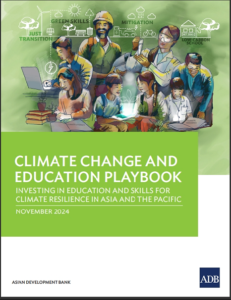 The Asian Development Bank (ADB) has emphasized the need to make schools in Pakistan climate-resilient to better adapt to the growing challenges of climate change. This recommendation aligns with the country’s increasing vulnerability to climate-induced disasters such as floods, extreme heat, and unpredictable monsoons, which have severely impacted educational institutions, disrupting learning and damaging infrastructure.
The Asian Development Bank (ADB) has emphasized the need to make schools in Pakistan climate-resilient to better adapt to the growing challenges of climate change. This recommendation aligns with the country’s increasing vulnerability to climate-induced disasters such as floods, extreme heat, and unpredictable monsoons, which have severely impacted educational institutions, disrupting learning and damaging infrastructure.
The “Climate Change and Education Playbook” underscores the severe educational disruption caused by the 2022 floods in Pakistan, highlighting the urgent need for climate-resilient infrastructure and policies in education. During these catastrophic floods, approximately 17,000 schools were damaged or destroyed, interrupting the education of 2.6 million children. This widespread devastation exposed the vulnerability of educational institutions to extreme weather events, emphasizing the necessity for systemic reforms to protect schools and ensure continuous learning in the face of climate crises.
The playbook advocates for strategies that include strengthening school infrastructure, integrating climate change awareness into educational curricula, and fostering community resilience. By addressing these challenges, Pakistan can better safeguard the education sector from future climate impacts, ensuring that students can continue their studies even in the wake of environmental disasters. Investing in climate-resilient education is crucial to building a sustainable, inclusive, and adaptive future for the nation’s youth.
The “Baku Initiative on Human Development for Climate Resilience,” unveiled at a high-level meeting during COP29, underscores the vital role of education in combating climate change and fostering resilience. The initiative aims to harness the power of education to build adaptive capacity in communities, ensuring no one is left behind as climate impacts worsen. A key focus is on enabling transformative climate literacy for children and youth, empowering them with knowledge and skills to address the climate crisis. This effort emphasizes the integration of climate-related themes into educational curricula, fostering a deeper understanding of environmental challenges and sustainable solutions.
The initiative also highlights the importance of building green skills among the current and future workforce to meet the demands of a changing economy. By equipping individuals with skills for sustainable industries, it supports the transition to greener economies while enhancing resilience to climate impacts. Moreover, it emphasizes incorporating human-centered approaches into future Nationally Determined Contributions (NDCs), reflecting a commitment to inclusive development.
During the devastating 2022 floods in Pakistan, Sindh province was among the worst-affected regions. The floods caused widespread damage to educational infrastructure, severely impacting the schooling system in the area. Approximately 12,000 schools in Sindh were reported as either partially or completely damaged. This led to massive disruptions in the education of hundreds of thousands of children, compounding challenges faced by an already strained educational sector.
Citable URL: https://www.adb.org/publications/climate-change-education-playbook
